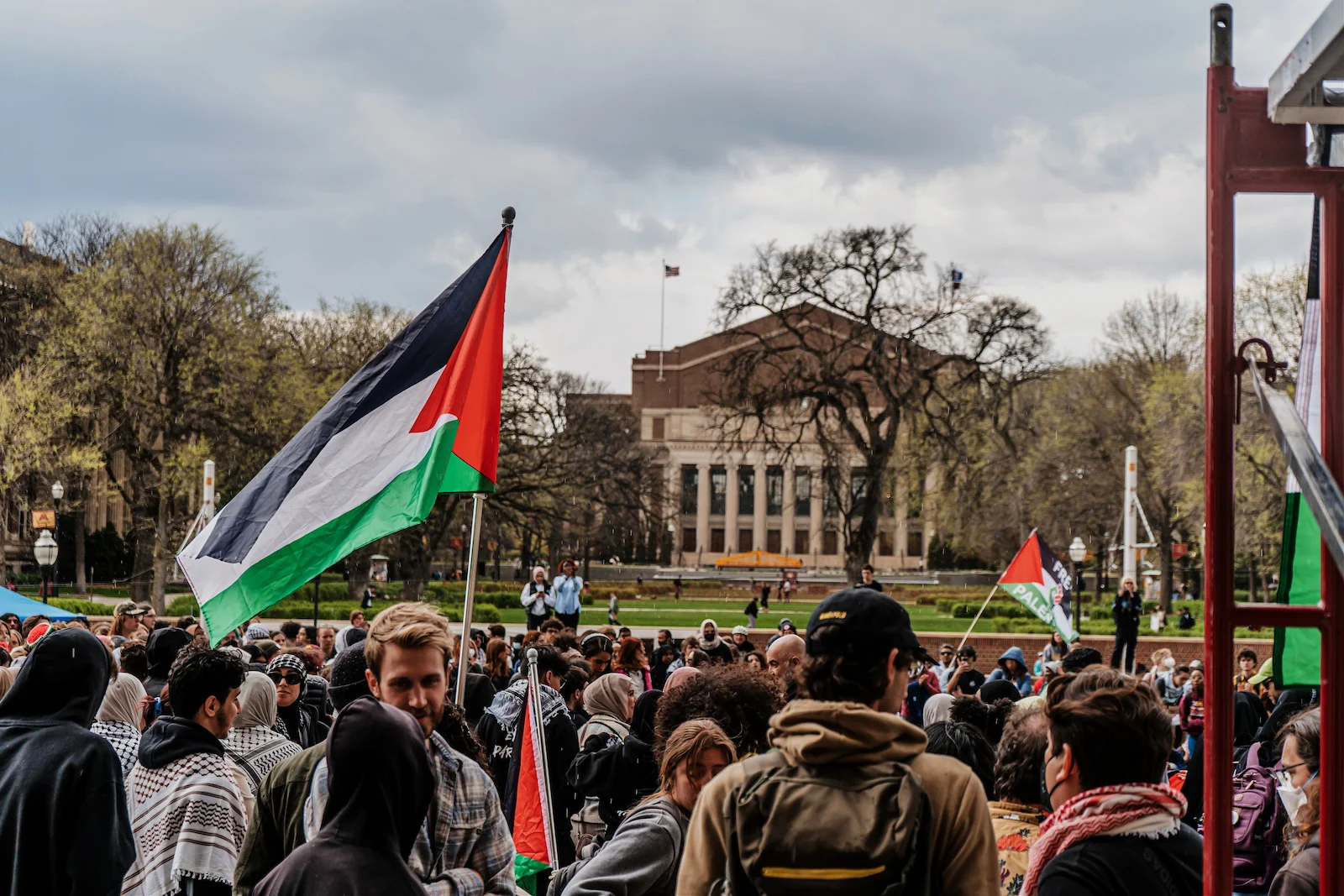
Anti-Zionism is not Antisemitism
In recent weeks, student protests have surged across major college campuses, including UCLA, Columbia University, and the University of Texas, and have spread throughout the Western world. These demonstrations are in response to Israel’s brutal military campaign in Gaza that has killed over 35,000 civilians, according to the UN’s Office for the Coordination of Humanitarian Affairs (OCHA).
In response to the college protests, the House of Representatives recently passed legislation, which according to the Associated Press, would “establish a broader definition of antisemitism for the Department of Education to enforce anti-discrimination laws, the latest response from lawmakers to a nationwide student protest movement over the Israel-Hamas war. The proposal, which passed 320-91 with some bipartisan support, would codify the International Holocaust Remembrance Alliance’s definition of antisemitism in Title VI of the Civil Rights Act of 1964, a federal anti-discrimination law that bars discrimination based on shared ancestry, ethnic characteristics or national origin. It now goes to the Senate where its fate is uncertain.”
The legislation, titled Antisemitism Awareness Act, employs the International Holocaust Remembrance Alliance’s (IHRA) definition of antisemitism. This definition has sparked controversy for its potential to equate legitimate criticism of Israel with antisemitism, thereby stifling public discourse on the issue.
In a surprising turn, even Marjorie Taylor Greene, known for her flirtations with QAnon and a tendency to sprout antisemitism, voted against the bill. The Act’s passage has fueled fears among students and free speech advocates that it could undermine Americans’ right to openly discuss and critique Israeli policies.
As protests continue to gain momentum, the debate over the balance between combating antisemitism and protecting free speech remains at the forefront of national discourse.
The International Holocaust Remembrance Alliance defines antisemitism as, “Antisemitism is a certain perception of Jews, which may be expressed as hatred toward Jews. Rhetorical and physical manifestations of antisemitism are directed toward Jewish or non-Jewish individuals and/or their property, toward Jewish community institutions and religious facilities.”
More broadly, to shield Israel from international condemnation for its war in Gaza and its policies towards Palestinians, Israel’s defenders often label any criticisms of Israel as antisemitism.
Before the rise of Zionism in the 19th century, Muslims and Jews shared a history of coexistence. During the Crusades, and notably in 1492, Ottoman Sultan Bayezid II dispatched rescue ships to Spain to save Sephardi Jews facing expulsion and persecution under the Alhambra Decree. These Jews were safely brought to Islamic lands, where they found refuge.
Under the reign of Suleiman the Magnificent, Christians, Muslims, and Jews coexisted harmoniously in Ottoman Palestine. This period of religious tolerance stood in stark contrast to the violent sectarian conflicts in Europe, where Catholics and Protestants waged brutal wars over biblical interpretations.
While Ottoman Palestine achieved a degree of religious harmony, Europe was marked by witch hunts and the rise of racialized antisemitism, which intensified in the 19th century. This historical context highlights the complex and varied nature of Jewish-Muslim relations before the advent of modern political movements.
Then in the late 19th century, an Austro-Hungarian Jewish scholar named Theodor Herzl published a pamphlet called, Der Judenstaat (The State of the Jews), after witnessing mobs of Frenchmen chanting, “Death to Jews,” due to an event known as the Dreyfuss Affair, arguing that the only way to escape the rising racialized antisemitism in Europe and North America was to create a Jewish majority ethnostate in historic Palestine.
At that time, Palestine was controlled by the Ottoman Empire, which by the late 19th to early 20th centuries had accumulated a mountain of debt, so Theodor Herzl tried to buy Palestine from the Ottomans, to which the Ottoman Sultan and Caliph outright refused, “I cannot sell even a foot of land, for it does not belong to me but to my people.” Contrary to a common misconception among many Westerners, the seeds of the Israeli-Palestinian conflict were not planted in 610 A.D. with the advent of Islam and the prophethood of Muhammad. Instead, the roots of the modern conflict can be traced to Herzl’s efforts to establish a Jewish homeland in Palestine during the waning years of the Ottoman Empire.
This pivotal moment in 1896 marked the beginning of a series of events that would eventually lead to the longstanding and complex conflict we witness today.
Two decades after Theodor Herzl attempted to purchase Palestine, the British Empire seized the territory from the Ottomans during the First World War, establishing the British Mandate for Palestine. According to the first census conducted under British rule, the population consisted of 589,177 Muslims, 83,790 Jews, and 71,464 Christians.
In 1917, British Foreign Secretary Arthur Balfour penned a letter to Lionel Walter Rothschild, pledging British support for the establishment of a Jewish state in historic Palestine. This promise, known as the Balfour Declaration, came despite Britain’s earlier wartime commitments to the Arab populations. The British had assured the Arabs of an independent kingdom spanning the Arabian Peninsula, Mesopotamia, and the Levant.
Additionally, in 1916, the British and French governments agreed to divide the conquered Ottoman territories between them. This agreement, known as the Sykes-Picot Agreement, involved drawing arbitrary borders on a map, a decision often cited as a foundational cause of many modern Middle Eastern conflicts.
The conflicting promises made by Britain during and after the First World War laid the groundwork for the complex and ongoing struggles in the region.
In 1947, the Jewish community was still reeling from the horrors of the Holocaust, garnering immense sympathy from Western powers. In response, the United Nations proposed a partition plan to divide Palestine into separate Jewish and Arab states. However, the Palestinians rejected this proposal, perceiving the influx of Jewish settlers from North America and Europe as a form of colonization. This rejection set the stage for further conflict, as the local population resisted what they saw as an external imposition on their land.
On May 14, 1948, the State of Israel was officially established. Within minutes, U.S. President Dwight D. Eisenhower recognized the new state, signaling unwavering American support. However, starting the following day, approximately 800,000 Palestinians were forcibly displaced, being told to leave or face death.
Two decades later, in 1967, the Arab nations of Egypt, Syria, and Jordan, with support from other Arab states, attempted to invade Israel in response to its treatment of Palestinians. Israel, however, emerged victorious, leading to the occupation of the West Bank, East Jerusalem, the Gaza Strip, and the Golan Heights. Although Israel withdrew from Gaza in 2005, the subsequent election of Hamas in 2006 led to a 17-year blockade of Gaza and the ongoing Israel-Hamas conflict.
The Antisemitism Awareness Act, along with the IHRA definition of antisemitism, has sparked significant controversy. Critics argue that these measures not only overlook the history of the Zionist movement, which is deeply rooted in European settler-colonialism but also set a dangerous precedent for free speech on college campuses.
Prominent free speech advocates like Milo Yiannopoulos, Paul Joseph Watson, Ben Shapiro, Steven Crowder, Bill Maher, Ricky Gervais, and Sam Harris have remained conspicuously silent or have actively supported Israel’s actions in Gaza. The Gaza death toll currently stands at 35,386, with another 500 killed in the occupied West Bank, the majority of whom are women and children. This number far surpasses the 1,200 deaths from the October 7th attacks by Hamas, which occurred after 17 years of siege, frequent Israeli incursions into the Al-Aqsa Mosque compound, and the controversial importation of red heifers from Texas, linked to Jewish end-times prophecy.
It is not antisemitic or anti-American to criticize a foreign government, especially when respected human rights organizations describe its actions as genocidal. Boycotting products from companies complicit in such actions is a legitimate form of protest. Furthermore, advocating for a non-violent boycott against companies supporting Israel respects American intelligence and aligns with the principles articulated by George Washington, who warned against permanent alliances and foreign entanglements in his 1797 farewell address.
It is time to hold Israel accountable and to safeguard free speech, particularly on college campuses.
